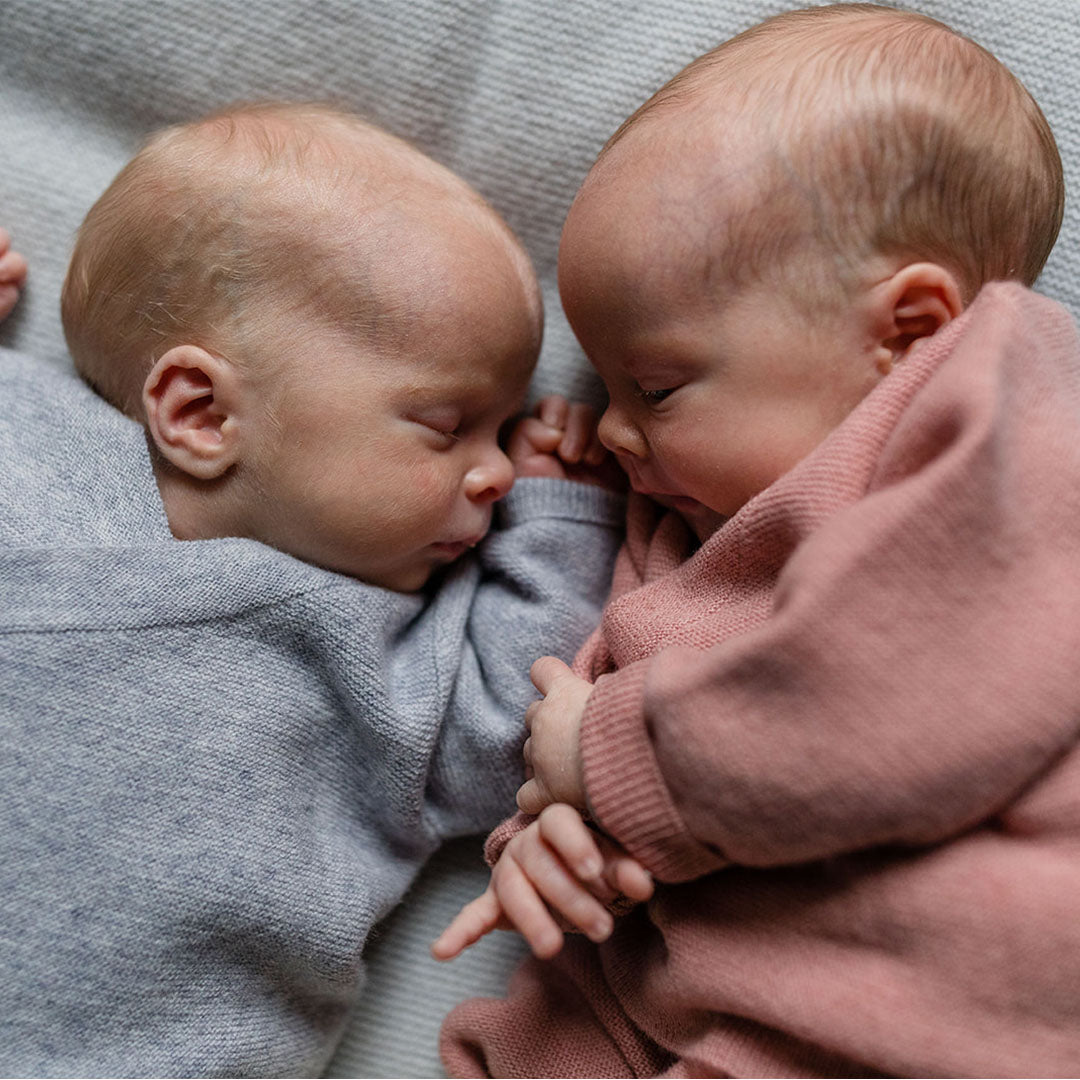Pregnancy, childbirth, becoming parents and being a parent involve a number of legal and bureaucratic formalities, some of which can be exhausting and nerve-wracking. Applications, timings and forms - a seemingly opaque and overwhelming topic. So that you do not forget anything that is important, we have compiled the most important facts for you with the help of lawyer Sandra Runge. Sandra specializes in employment law and one of her main areas of focus is discrimination in connection with pregnancy, parental leave and re-entry.
The most important facts
1st trimester / weeks 1-12
You should enjoy your pregnancy and so that you can get through the birth carefree and enjoy being a mom to the fullest, it is helpful to find out about the benefits of your health insurance company on these topics at an early stage. Especially if you are privately insured, you should keep an eye on this, since private health insurance companies do not automatically cover many services provided by statutory health insurance.
Services that are particularly important to you during this time:
- Medical check-ups and prenatal care
- Services related to childbirth, such as inpatient or outpatient termination, birth in a birth center or home birth
- Midwife support
- Which medicines, dressings and remedies are covered by your health insurance company during and after your pregnancy
- Home care and a domestic help: should you need support during pregnancy or childbirth, if you live alone or have no person in the household who can support you
- The maternity benefit
- Services and benefits that your health insurance company pays for you or your unborn child after the birth if your child falls ill and you cannot go to work
- It makes sense to think about how your child should be insured in the future, through you or your partner. It may be useful to change health insurance in advance.
So that you can enjoy your pregnancy, childbirth and parental leave to the fullest and do not have a rude awakening when you return to work, it makes sense to deal with the subject of legal protection, if you do not already have one. Because unfortunately, the subject of dismissal after returning from parental leave is not uncommon, which Sandra Runge has to notice again and again. That's why we want to give you the most important information without making you feel bad, but should it happen to you, you know the most important facts about the legal situation.
Protection against dismissal
Mothers or mothers-to-be and fathers are subject to special protection against dismissal twice.
1. Maternity protection against dismissal, which applies during pregnancy up to 4 months after the birth (§ 9 MuSchG)
2. The parental leave protection against dismissal, which takes effect during parental leave (§ 18 BEEG)
This means that if your parental leave follows the maternity leave period seamlessly, you are protected against dismissal from the first day of your pregnancy until the last day of your parental leave. However, this expires when you return to work. After your parental leave, you fall under the general (and weaker) protection against dismissal (§§ 1, 23 Abs. 1 S. 3 KSchG). According to this, a termination would be ineffective if you were employed by your employer for more than 6 months, your employer regularly employs more than 10 workers, the termination is socially unjustified, provided that there are no personal, behavioral or operational reasons.
Important: If you are affected by a termination and want to take action against it, you must do so within three weeks of receiving the letter of termination and file an action for protection against unfair dismissal with the labor court.
Since you have to bear the costs of this lawsuit yourself, regardless of the outcome in the first instance, legal expenses insurance is important. It covers the costs of your lawyer in the event of termination.
2nd trimester / weeks 13-18
If you have a very close and trusting relationship with your employer and it feels good to announce your pregnancy before the 13th week of pregnancy, then you should do so. Because especially in the first few weeks, the tiredness and, in frequent cases, the nausea associated with the hormonal change is very great, so that you can no longer perform your full work and it is often easier to play with open cards.
If you work in a profession that involves physically difficult or dangerous work, it is also advisable to inform your employer as soon as possible. As an employer, he is obliged to fulfill his protection obligations under the Maternity Protection Act , which he can only fulfill if he knows it.
If you do not have any limitations (physical or mental) and your work does not pose a danger to you or your unborn child, it is advisable to inform the employer in the 12th week of pregnancy. Because you will then have survived the critical time when miscarriages are statistically the most common.
When you take parental leave, you are entitled to an interim report, which you would not normally have. Since it often happens that direct superiors, who are best able to assess your previous work, no longer work in the same position after returning from parental leave or have even left the company, it makes sense to apply for an interim reference now. You shouldn't do without it.
3rd trimester / weeks 29-40
Provided you are legally insured, you are entitled to maternity benefit from the health insurance company during the maternity leave period.
The maternity allowance is 13 euros per day. If you are insured privately or through your partner, you have a one-off claim to EUR 210 from the Federal Insurance Office.
To apply for maternity benefit, you need documentation of your pregnancy and your expected date of delivery, which you must send to your health insurance company.
You can apply online here:
To the application
Parental allowance is a state income replacement benefit and is usually applied for at the youth welfare office. You are entitled to parental allowance if you:
- has his usual place of residence or abode in Germany
- takes care of his baby himself
- lives with his child in the same household and does not have full-time employment during the entitlement period
The parental allowance is between 65% - 67% of your average net income in the last 12 months before the birth of the child. At least 300 euros but a maximum of 1,800 euros per month.
Attention: If you and your partner earn more than 250,000 euros a year together, you will no longer be entitled to parental allowance. Since this can only be confirmed afterwards with the annual tax assessment, you should take this into account beforehand, otherwise you will have to pay back the parental allowance if the case arises.
There is also parental allowance for mothers who did not work before the pregnancy, e.g. for housewives or students. If this affects you, you can find more information here.
Basic parental allowance : The parental allowance is entitlement for 12 months + 2 partner months. Single parents receive parental allowance for 14 months.
Parental allowance plus: With parental allowance plus, you receive half of the actual entitlement, but over twice the period.
Sibling bonus: There is also a sibling bonus that parents can apply for if they have children under the age of 3 in the household. This increases the parental allowance by 10%, at least by EUR 75 per month for basic parental allowance or by EUR 37.50 per month for parental allowance plus.
Partnership bonus: The partnership bonus is an offer for parents who share their family and professional responsibilities among themselves as partners. They each receive up to four additional months of parental allowance if they both work part-time (25-30 hours per week) during this time.
You and your:e partner:in can use the parental allowance calculator to conveniently calculate the respective parental allowance online:
To the parental allowance calculator
To apply, you need some documents, which you can find here:
You should submit the application as soon as possible after the birth, but no later than three months after the start of the parental allowance period.
In Germany, if the mother is unmarried, she has sole custody.
If you are not married, but you and your partner would like to share custody, you can submit a declaration of custody to the youth welfare office or a notary before the birth. However, the declaration of custody only becomes effective when the father acknowledges paternity. This document should be in the hospital bag as it is required for registering the birth.
Acknowledgment of paternity
If you are not married to the father of your child, you must have paternity recognized when your child is born. An acknowledgment of paternity can be made at any time at the registry office, the youth welfare office or a notary and must be publicly certified in any case. This means that paternity must be declared in the presence of a person authorized to certify (e.g. the notary or a specialist employed by the registry office or youth welfare office). The acknowledgment of paternity also belongs in the hospital bag. It is also required to register the birth.
Parental leave is the time that the legislature grants and frees you from the obligation to work so that you can take care of your baby. Of course, your partner can also apply for parental leave.
Prerequisites for parental leave are:
- You are in a permanent employment relationship (self-employed persons are not entitled to parental leave)
- You live with your child in a household and look after it yourself during the time it is used
The parental leave entitlement exists until the child has reached the age of three, i.e. a total of 36 months. This right applies to both parents. Every mum and dad can take a total of 36 months of parental leave, regardless of the job they do. The following applies to mums: Parental leave only begins after the end of the maternity protection period after the birth, i.e. 8 weeks after the birth.
The registration period for parental leave within the first three years of your child's life is seven weeks before the start of parental leave. If your parental leave begins immediately after maternity leave, you must inform your employer in the first week after the birth at the latest how long you would like to take parental leave. However, you often know this in advance and can let your employer know. This way you and your employer can plan better. It is important that this information is binding. If you have any change requests during parental leave, these are based on the “goodwill” of the employer.
For parental leave taken between the child's third birthday and the child's eighth birthday, the deadline is 13 weeks before it begins.
Important tip: If you have a second child while your first child is on parental leave, you can interrupt your parental leave for the duration of the maternity leave period. During this time you are entitled to maternity benefit again.
You can then add these 14 weeks to the parental leave of the second child. If you have not worked since your first child was born, then the basis for maternity benefit will be your average net income before the birth of your first child.
You can find more information and a template for registering parental leave in Sandra's book “ Don't worry be Mummy ”.
rejoining the employer
If you know how and when you want to return to your job, you can discuss this with your employer before the birth. This makes planning easier for the employer and gives you a feeling of security. As moms, we know that the (inner) pressure to start again is often very high. So it's not uncommon for it to be the moms in particular who fall by the wayside. Our tip: Better to start with less, see how work-child-life develops and adjust your workload if necessary, because life and work with children is something completely new and different. It sometimes takes a little time here.
All of these points and much more can be found conveniently summarized in our postpartum and postnatal calendar.
Login here to download the calender.And if you need it even more organized, here's a checklist for legal matters before and after childbirth
Login here to download the checklist.After the birth there are other important to-do's that you should have on the screen. You will find a summary of this in the “Birth & Postnatal” cycle:
Login here to download the checklist.
Book tip
don't worry, be mummy
If you want to know more or want to deepen the whole thing, we recommend the book by Sandra Runge " Don't worry, be mummy "




